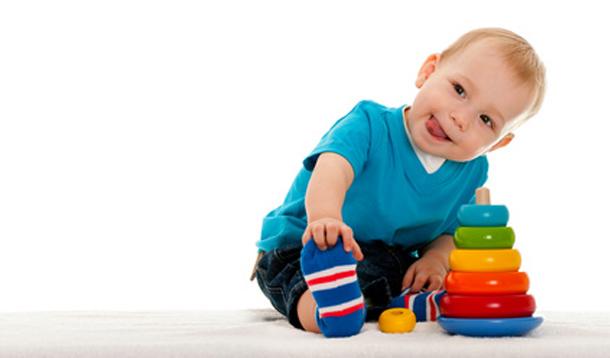
Research shows that play is a basic necessity to your baby, just as food and shelter is. Play helps stimulate your baby and encourages his cognitive and physical development. It's fundamental to your baby developing the concentration and communication skills so necessary to life; it encourages him to explore and helps him to make sense of his environment; and it enhances your communication and bond.
Independent and interactive play helps your child understand his world through his senses: touch, sight, sound, smell, and taste.1 From birth to two years is an important period of sensory exploration, and play is crucial to its healthy development.
Dangle objects over your baby as he lies on the floor so that he can swat at them. Reaching and grasping at objects, such as the rattle, helps develop motor skills.2 As babies gain more control over their movements, they'll interact more and more with their surroundings through play.
Talking to your baby lays the foundation that helps him to develop language skills and become a good communicator, an essential life skill that is enhanced through games and play. Through experimentation and practice during play his interaction with you and communication is enhanced. Play is critical to the development of your baby's ability to express himself, interact with others, and learn.
Play helps babies understand cause and effect. When they swat at the toy hanging from their stroller it moves, when they shake the rattle it makes a noise. When babies realize that they can make something happen through their own actions they begin to interact with their environment, and they understand that they have an effect on their world.
Learning to play well, from an early age, leads to contented and sociable babies. As baby grows, and plays more interactively, he learns valuable lessons about give and take, and effective communication with others.
Play music for your baby and hold him while you dance to it.
Sing to your baby and read to him. Babies respond to rhythm, particularly brightly illustrated rhyming books. Pointing to the images as you read to him will enhance baby‘s ability to track objects, and to develop the ocular mobility necessary to prepare him for reading later in life. Place a mobile or hanging toys above baby‘s crib and from his stroller — reaching for them will also help baby develop his sense of distance. Take your baby on frequent walks: to the park, the mall, anywhere where he has an opportunity to see, smell, touch, and hear new things.
Babies love games that involve singing, noise and movement, and they'll respond well if you exaggerate your movements while playing. Clapping games, such as Pat-A-Cake, are tried and true favourites. Even before baby is able to join in the rhyming and clapping will captivate him. Babies are fascinated by their feet and that may be one of the reasons why they respond so well to 'Little Piggy.' They'll also enjoy listening to you sing 'Head, Shoulders, Knees and Toes,' as you tap their body at the appropriate places in the song.
Play hide and seek by hiding one of your baby's favourite toys in one room, maybe behind a door or under a pillow or towel. Carry your baby from room to room calling out: "Where's [name of toy]?" Pretend to actively look for it three or four times before excitedly finding it and saying "There's [name of toy]!" You may also want to roll a ball to your baby and encourage him to roll it back to you. The first couple of times, you may have to show him what to do. Clap and praise him enthusiastically each time he rolls it back to you.
Play is not only fun, it is necessary to your baby's healthy emotional and physical development. Multiple play sessions daily are important, and — of course — all games should end with a kiss and a cuddle.